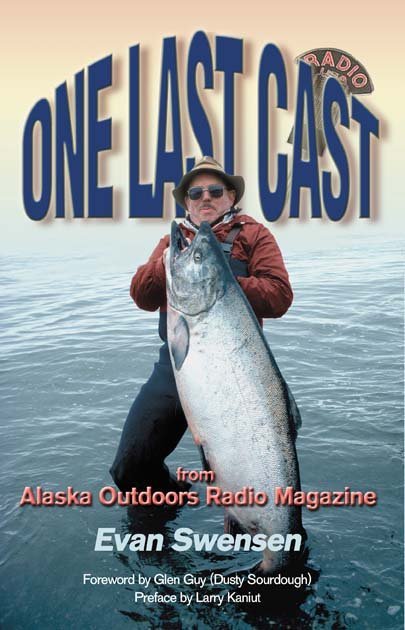One Last Cast
From Alaska Outdoors Radio Magazine
By Evan Swensen
Chapter Fifty-Six
Thanks to the Men Who Teach Boys

The 14-year-old boy approached the bank of Pelican Creek with caution. Standing on tiptoes, he was able to see over the edge to the water. The water was clear and coming over his shoulder; the sun penetrated the surface, exposing the largest trout the boy had ever seen. With his heart pounding in his chest loud enough to scare the fish away, he quickly set up the steel telescoping fishing rod and put a night crawler on the Eagle Claw hook.
The youthful angler was not wearing traditional fishing clothes. Instead, he wore hiking boots, faded blue jeans, and a dark green shirt. On the sleeves and pockets of his shirt were patches from the organization he was a member of. They were not from Trout Unlimited, Fly Fishing Federation, or the local fishing association. One large patch identified the wearer as a Boy Scouts of America troop member. Smaller ones designated skills earned or camps attended.
Pelican Creek, in Yellowstone Park, is several hundred miles from the boy’s home. Standing behind and encouraging the fisherman is his scoutmaster. Scoutmaster Hap Glad encouraged and helped him earn money to join the troop on their summer super activity: ten days of wilderness camping and fishing.
Getting ready for the excursion was an event in itself. Camping, cooking, first aid, and swimming skills were taught, learned and demonstrated. Merit badges were earned, and advancement in rank was achieved. Saturday night fundraising movie tickets were sold, newspapers were collected, doughnuts were delivered, and lawns were mowed and raked. The money was earned, and how to work was learned.
Now wearing the badges of achievement on his chest, the young man is about to attempt to catch a fish almost as long as his arm. Knowing if he gets too close, the trout will spook, making the boy stop 10 feet short of the water’s edge. He doesn’t want to cast his shadow on the water. His arm is shaking so much he can hardly throw the rod. The cast is six feet too long. Before he can retrieve the bait and throw again, the fish turns and eyes the night crawler. It is evident the trout can see the worm in the clear water.
Scouter Hap Glad coaches from the rear. “Don’t move,” he whispers. He had been coaching the scout for several months. Helping him raise funds and earn the awards. Shorter overnight hikes in the mountains and camps on the lakes were taken. The young man is now at home in the woods sleeping in a tent, and comfortable eating his own cooking from a campfire. A positive self-image has developed through working to earn his way and achieving his awards presented at the Court of Honors.
Every muscle in the boy’s body is tense and tight. The fish sizes up the bait for what seems like an eternity. Its tail and fins move, keeping it sideways in the creek’s current. Slowly it moves forward about two feet and then stops again. The once-pounding heart of the scout also seems to stop. Then the fish makes its decision. With a burst of color, the trout charges the bait like a lightning bolt.
This is why the boy had hiked eight miles with his heavy pack and spent nearly every Saturday for five months raising funds, why he worked so hard to learn outdoor skills and fishing techniques.
In a fraction of a second, it was over. Taut nerves and youthful impatience caused the young angler to set the hook before the strike was complete. The bait and hook came out of the water empty. The fish, now knowing something was wrong, headed for cover.
What his scoutmaster told the disappointed boy is lost to memory. What is remembered are the lessons and the love for the outdoors retained. I know. I thank God for leaders like Hap Glad and the Boy Scouts of America. I am grateful for fresh air, forested mountains, camping, fishing, and other outdoor activities. I hope every boy can belong to a scout troop and have a scoutmaster who cares and teaches.
That was the last time I set the hook before a fish took the bait.


